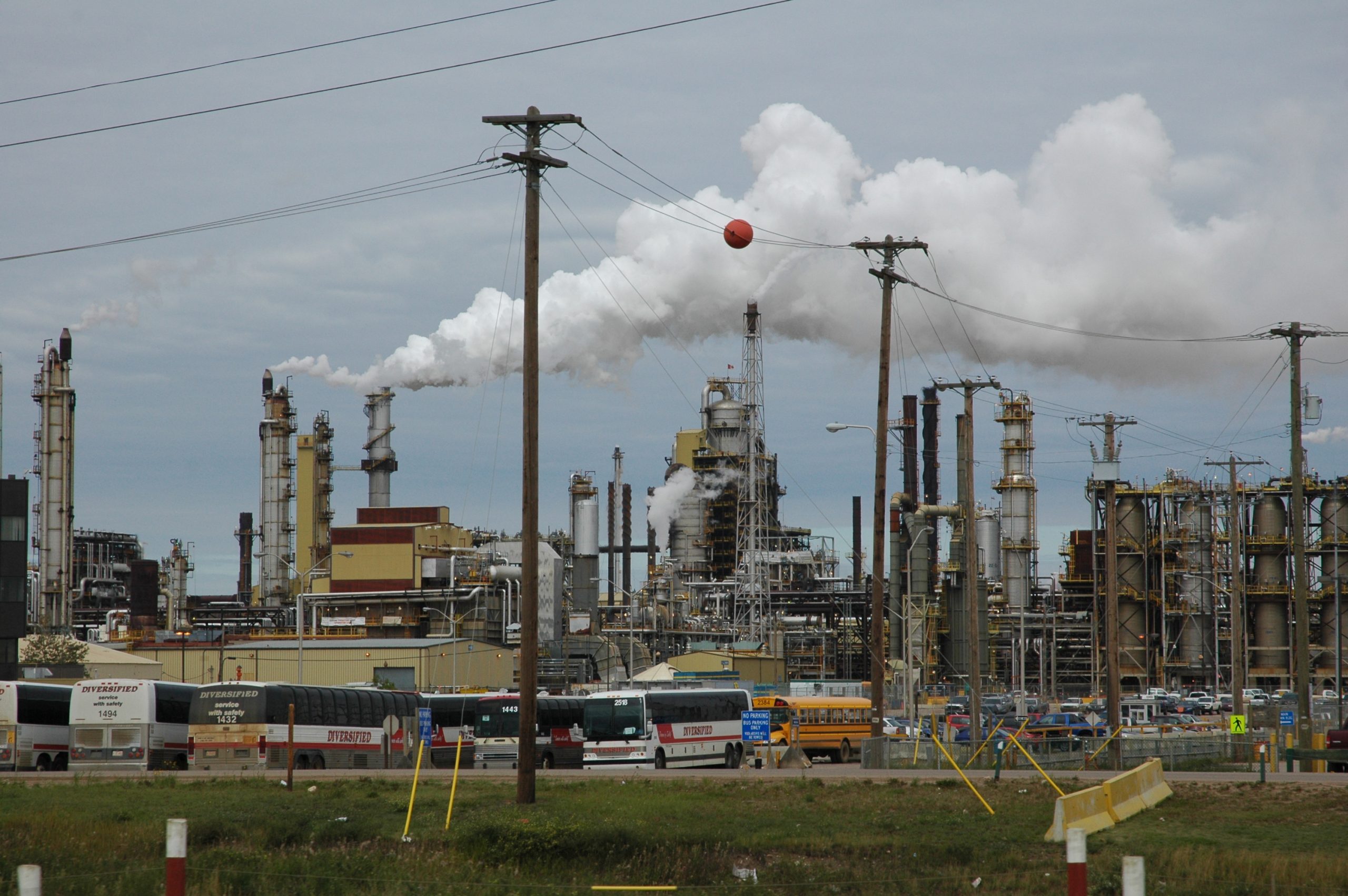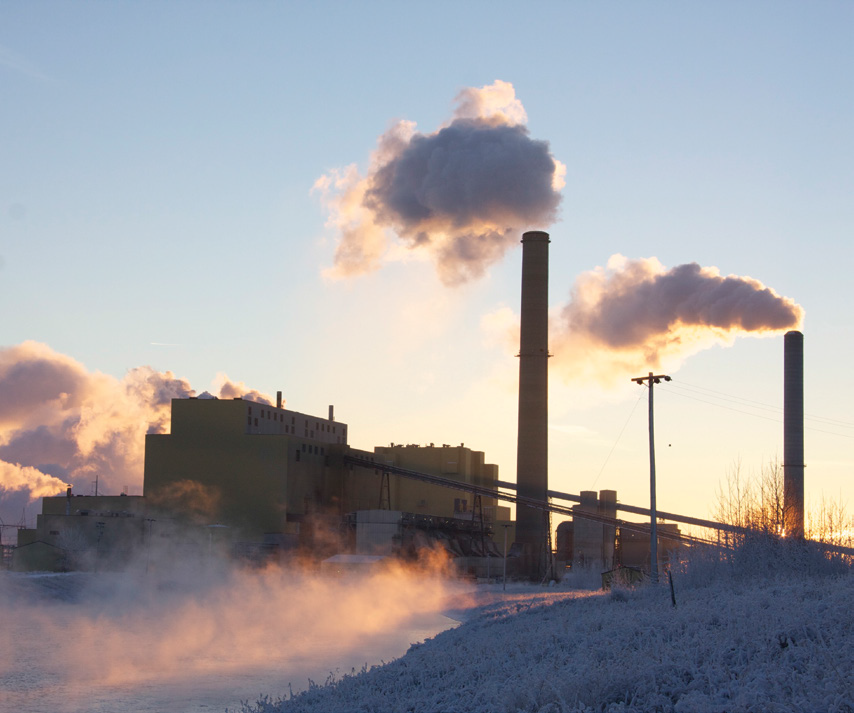
Canada and Alberta at the Controversial COP28
December 12, 2023
- •
- •
- •

A Syncrude plant in 2008. Photo © C. Wearmouth.
Canada’s federal government recently made a handful of overdue, yet welcome announcements which should hopefully help us move towards meeting our climate targets. They came amid the 2023 United Nations Climate Change Conference, also known as the Conference of the Parties or COP28.
The event has been mired in controversy so far. This year’s climate conference welcomed a record number of oil and gas industry lobbyists, with nearly 2,500 individuals associated with the oil and gas industry invited to participate. Leaked documents then revealed that the United Arab Emirates (UAE), the hosts of this year’s conference, planned to use COP28 to facilitate new oil and gas deals between nations and industry representatives, which could be one reason for the industry’s outsized attendance at this year’s event. On top of that, the president of COP28, Sultan Al Jaber of the UAE, publicly stated that he feels there is “no science” behind the growing demands to phase out fossil fuels. COP28 is supposed to serve as an opportunity for parties to come together to plan meaningful steps to address the climate crisis, and it seems that those responsible for organizing this year’s event have been working in direct opposition to developing or implementing solutions. Or, at the very least, they have sought to use the event to benefit the industry most responsible for driving climate change.
Canada pledges some funds
The first positive news out of Canada’s participation at COP28 was the announcement of the Canadian government’s initial pledge of $16 million towards a global fund to address loss and damages from climate change. This announcement made Canada one of the first contributors. The fund is intended to support the most vulnerable countries and communities in the over-exploited global south who are on the front lines of the most harmful impacts of climate change, and which are predominantly driven by emissions from countries in the global north, such as Canada and the United States.
Although this announcement is welcome news, the initial contribution amount of only $16 million has been heavily criticized by environmental and social justice groups across the world. Especially since recent estimates show that losses and damages in developing countries are already greater than $400 billion USD per year. While $16 million may sound like a sizable investment, in 2022 Canada gave nearly $22 BILLION to the fossil fuel industry, according to data from Environmental Defence Canada. This recent contribution is about a tenth of one percent (0.10%) or in other words, a fraction of what the feds gave to already wealthy oil and gas companies.
New draft methane regulations
More welcome news: On Dec. 4, Steven Guilbeault, Canada’s Minister of Environment and Climate Change (ECCC) announced the country’s new draft methane regulations intended as an amendment to our 2018 methane regulations. These are meant to ensure Canada meets its 2025 methane emissions reduction target of 40 to 45 percent below 2012 levels. Canada expects these new regulations to reduce our emissions by approximately 217 megatonnes (Mt) of carbon dioxide equivalent emissions.
New emissions cap framework
Then on Dec. 7, Guilbeault alongside Jonathan Wilkinson, Canada’s Minister of Energy and Natural Resources finally announced the long-awaited and long-overdue draft framework for an emissions cap for Canada’s oil and gas sector. This framework outlines Canada’s proposed “market-based cap-and-trade” system which is intended to limit emissions from oil and gas production, which allowing for “some compliance flexibilities.”
Here’s the caveat to the good news: Canada’s oil and gas sector is the nation’s largest emitting sector and is responsible for nearly 30 percent of the country’s entire emissions footprint (based on 2021 data). Canada’s Commissioner of the Environment and Sustainable Development recently reported that delays to the release of an emissions cap for the oil and gas sector were partly to blame for why Canada was failing to meet our emissions targets, especially since this cap was proposed under the 2030 Emissions Reduction Plan, announced nearly two years ago in March 2022. While we applaud the release of this draft framework, it is not the same as implementing actual regulations, and we encourage Canada to act swiftly with the release of its regulations to prevent us from falling further behind.
We are also concerned that the draft emissions cap framework for the oil and gas sector falls short of the emissions reductions required to meet our international climate commitments. The draft framework proposes an emissions reduction of 35 to 28 percent below 2019 levels by 2030, yet the commitment we made — and what current science says is required to minimize the worst impacts of climate change — is 40 to 45 percent.

Keephills Generating Station PHOTO: © I. URQUHART
The cap on emissions caps
We should note that Canada’s announcement of the draft framework states that: “The proposed emissions cap sets a limit on pollution, not production.” Meanwhile, Alberta’s Premier Danielle Smith in her joint statement with Alberta’s Minister of Environment and Protected Areas Rebecca Schulz called the framework a “production cap” and an “intentional attack” by the federal government on the economy and financial wellbeing of Albertans. While also labelling ECCC Minister Guilbeault as an “eco-extremist.” This is important to recognize, because despite Canada’s announcements being a step in the right direction these initiatives are largely insufficient, yet the government of Alberta is branding them as extreme.
Another concern is that the draft emission cap framework seems to allow industry to buy their way out of compliance. The emissions cap will allow industry to purchase “carbon offset credits” or to make monetary contributions into what’s being called a “decarbonization fund” if they exceed the emissions cap. This seems to be a potential loophole that may allow for increasing emissions. If the only compliance tools available to the federal government are financial penalties, that is often an easy way for industry to avoid compliance, especially for an industry that is seeing billions in profits every quarter.
The emissions cap will also only apply to the emissions that result from the production of oil and gas, while most fossil fuel emissions are released downstream at the point of combustion by consumers. So, despite Danielle Smith claiming that the draft framework is a production cap (which it isn’t), recent evidence confirms that we actually do need a cap on production if we are going to meet our climate targets.
For example, a February 2021 article by Dan Welsby et al., published in Nature, found that the majority of all currently known fossil fuel reserves must remain in the ground to allow for a 50 percent chance of limiting warming below 1.5°. A May 2021 report by the International Energy Agency stated that all new fossil fuel development projects must be halted to meet net-zero emissions by 2050, and we will likely need to close half of all existing fossil fuel production facilities prematurely according to research by Kelly Trout et al., published in May 2022. All these findings show that an emissions cap alone isn’t nearly enough.
So, while an emissions cap is a welcome introduction, it still enables Canada, Alberta, and fossil fuel companies to continue pursuing false solutions such as carbon capture and storage (CCUS), certain forms of hydrogen, and small-modular nuclear reactors in an attempt to draw down emissions while maintaining business as usual extraction and production. Speaking of Alberta, on Dec. 2, ECO newsletter published a brief article highlighting Alberta as one of the many “unwelcome guests” in attendance at COP28. ECO is a newsletter published by environmental NGOs at most international climate conferences since the Stockholm Environment Conference in 1972, and this year’s edition is produced by the Climate Action Network.
Alberta awarded for blocking progress
The article highlights Danielle Smith’s paltry record on fighting climate change and emphasizes her 100-person delegation of “oil crony delegates,” her efforts to block Alberta’s renewable energy sector, her championing of false solutions like far-fetched carbon capture (CCUS) while permitting the destruction of carbon-dense peatlands in northern Alberta, and as previously mentioned, her attempts to undermine Canada’s push for an emissions cap on the oil and gas sector. And then again on Wednesday, Dec. 6, Alberta was given Climate Action Network’s prestigious (and perhaps, facetious) Fossil of the Day award, which has been presented since 1999, and is awarded to countries (or other jurisdictions) who are judged to have done their best to block meaningful progress in climate negotiations throughout the previous days’ talks.
At the time of writing (December 8, 2023) COP28 is still underway with likely more news to come, but the results so far have varied. Although it seems that the event has been coopted by fossil fuel interests to a greater extent than ever before, we are still encouraged that Canada seems to be moving in the right direction, albeit rather slowly, with this string of recent announcements. We hope that the government of Alberta doesn’t try to block or resist these new initiatives because as we have already highlighted, these announcements from Canada are still far off from the meaningful changes that are needed to make a real impact in the fight against climate change. To delay even these insufficient actions only risks increasing the harm to those most at risk from the impacts of climate change – including Indigenous communities and those in the global south.
For more information, please contact:
Phillip Meintzer, AWA Conservation Specialist
pmeintzer@abwild.ca